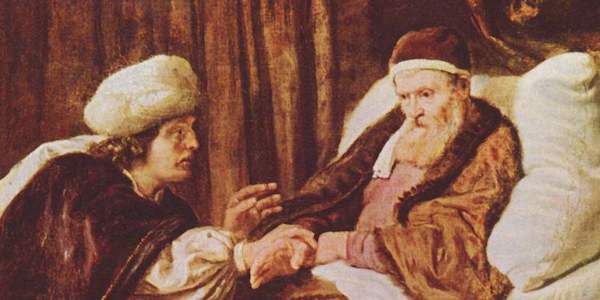 In Genesis 49, we read where Jacob blessed his twelve sons and their families, and prophesied about what would happen to their families in the future. A very curious phrase occurs in verse 10 where Jacob says, in speaking about the heritage of one of his sons, says this: “The sceptre shall not depart from Judah, nor a lawgiver from between his feet, until Shiloh come; and unto him shall the gathering of the people be.”
In Genesis 49, we read where Jacob blessed his twelve sons and their families, and prophesied about what would happen to their families in the future. A very curious phrase occurs in verse 10 where Jacob says, in speaking about the heritage of one of his sons, says this: “The sceptre shall not depart from Judah, nor a lawgiver from between his feet, until Shiloh come; and unto him shall the gathering of the people be.”
The verse clearly means that a representative of the tribe of Judah, a “Jew,” would rule until the coming of “Shiloh.” It is widely acknowledged that “Shiloh,” which probably means either “peaceful” ((“Shiloh,” Smith’s Bible Dictionary, MacSword)) or “him who is sent,” ((“Shiloh,” Hitchcock’s Bible Names Dictionary, MacSword)) denotes the Messiah, Jesus Christ. Either meaning of “Shiloh” fits, because Jesus is called the “Prince of Peace” (Isaiah 6:9) and is certainly “him who is sent” by the Father to save the world from its sins (see John 12:44-45, 49).
What, then, did Jacob’s prophecy about Shiloh mean? Wayne Jackson comments on this passage:
The historical facts are these. The substantial sovereignty of the nation [i.e., the nation of Judah named after the tribe—CC] never ceased until Herod Archelaus was removed from his position. Herod the Great’s wicked son, Archelaus, “reigned” over the Hebrews until he was deposed in A.D. 6 (cf. Matthew 2:22). The Jews henceforth were governed by the Romans through a series of procurators, one of whom was Pontius Pilate. It thus is clear that by the time the Romans took direct control over the Jews, the Hebrew “ruling” power (“scepter”) was completely and permanently gone. . . . “Shiloh” (Messiah) had come! His appearance is not awaiting the future. ((“Has the Messiah of the Old Testament Come?,” Christian Courier, https://www.christiancourier.com/articles/1085-has-the-messiah-of-the-old-testament-come (2014), parenthetical items in orig.; for further study of the continuance of Judah’s authority, see James McClintock and James Strong, Cyclopaedia of Biblical, Theological, and Ecclesiastical Literature, 12 vols. (New York: Harper & Brothers, 1894), 9:681.))
The dominant tribe of Judah ruled in at least the sense that King David and subsequent kings came from that tribe. “Jew” is a corrupted form of the word “Judah,” and refers to the people of the southern kingdom of Judah and Benjamin after the tragic schism of which we read in 1 Kings 12. ((“Jew,” Nave’s Topical Bible, MacSword)) The fact that Jews retained their relative political independence until just after Jesus was born, when Judah was reduced to the status of a Roman province, leads inescapably to the conclusion that Jacob meant to prophesy about Jesus, and to provide a definite indicator about Whom the Son of God would be.
Furthermore, the fulfillment of Jacob’s prophecy means that those ethnic Jews who are still waiting for the Messiah today are sadly misguided. It is impossible for Shiloh to come at this time or in the future, because Judah’s rule ended just over 2,000 years ago. If we reject Jesus, then we are without excuse. May we ever be prepared to show others the evidence that Jesus really is Who He claimed to be.